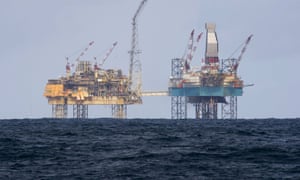
The cost of decommissioning North Sea oil rigs runs into billions.
Photograph: Jonathan Nackstrand/AFP/Getty Images
Leave oil rigs in the North Sea, say conservationists
Under ‘rigs to reefs’ idea, oil firms asked to consider turning decommissioned platforms into artificial reefs for marine life
Conservationists want oil companies and regulators to consider leaving more old rigs in the North Sea rather than removing them, with the savings paid into a fund to protect sealife.
After the Brent Spar debacle in 1995 when Shell provoked public outrage with plans to sink an old storage buoy, international regulations were imposed that work on the presumption that operators will remove rigs. Exemptions can be granted but are rare and on limited grounds.
The Scottish Wildlife Trust says a rethink is needed of how the Ospar rules are applied, due to the multibillion-pound cost of decommissioning rigs – and because in some cases it would be better for the environment to leave platforms to become artificial reefs for marine life.
Jonathan Hughes, the chief executive of the trust, said: “In the past, the natural reaction when you think of dumping a load of metal in the ocean is to throw your hands up in horror but when you look into it, it’s much more complicated. You could save money and have good environmental outcomes.”
The trust said the savings for oil firms and the government – which has also been criticised over tax relief on decommissioning costs – could be ploughed back into a marine stewardship fund, as a form of compensation for leaving rigs in-situ.
Hughes cited the example of MCP-01, a decommissioned North Sea rig owned by France’s Total that would have cost £387m for full removal or £11.7m to be made safe and left.
The intervention by the trust, which has more than 40,000 members and manages a network of 120 wildlife reserves across Scotland, comes as Shell starts work on one of the region’s most high-profile decommissioning jobs.
This month the world’s biggest ship removed one of the four platforms from Shell’s Brent field and delivered it to a Hartlepool scrapyard for recycling. The Anglo-Dutch oil firm recently awarded a contract to the oil services company Wood Group for the removal of a second Brent rig platform, Bravo.
The Scottish Wildlife Trust said it did not want to be prescriptive about what the fund could pay for, but said examples could include enforcement of marine protected areas, cleaning up plastic rubbish in UK waters and supporting marine science research.
The former energy minister Ed Davey and the environmentalist Jonathon Porritt have also suggested the industry should look more closely at the ”rigs to reefs” idea.
Shell said it could not comment on the trust’s proposal while a public consultation on Brent was under way.
WWF-UK warned against a blanket ”rigs to reef” option under the Opsar treaty. Lang Banks, the group’s executive director, said: “While finding new ways to fund the protection of our oceans and seas is important, it’s also important that any proposed scheme does not accidentally and fatally undermine one of the few legal mechanisms that currently exists to ensure the polluter pays anything at all.”










